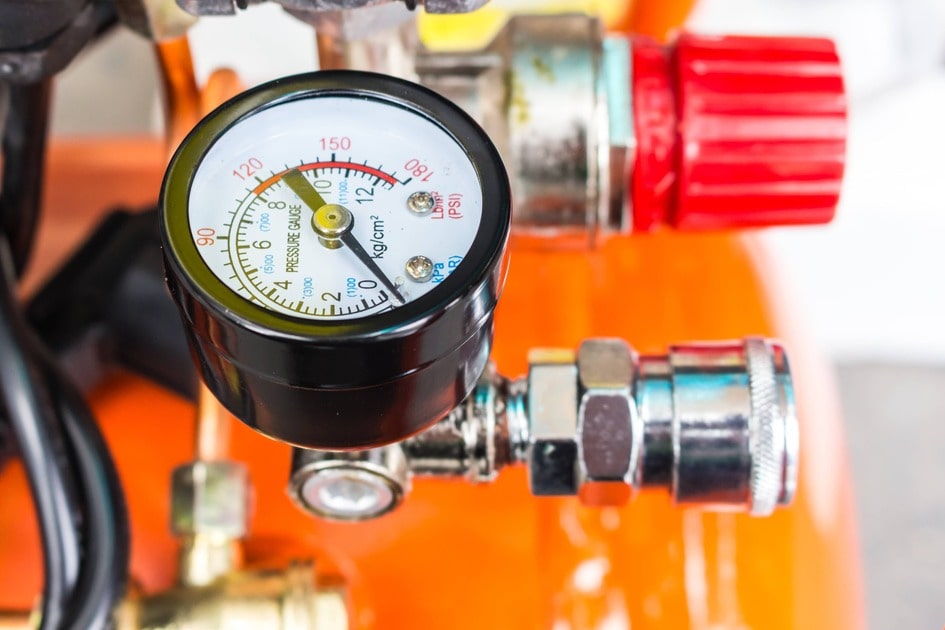
Though air compressors can be a very handy tool and pneumatic power source, they can also create a high noise level, making the search for a quiet compressor important to many business owners. However, just because you’re on the hunt for a quiet air compressor doesn’t mean that you have to have a lot of noise in the meantime. This article will delve into the causes of noise in a loud compressor, how to use different tools and techniques to quiet your air compressor, and what types of air compressor are the quietest to begin with.
How Loud are Air Compressors?
With the usual decibel range of a vacuum cleaner, an air compressor can be rather noisy. Used to power a pneumatic tool, air tool, air up car tires, or push paint or other material through a sprayer assembly, a silent air compressor is practically non-existent. However, that doesn’t mean that you can’t enjoy normal conversation in your shop without the loud noise of your portable air compressor operating in the background.
But let’s start by talking about how sound volume is measured. Sound output is measured in decibels, which increase on a logarithmic scale. A decibel is the smallest change in sound volume that the human ear can detect. Using the scale, this means that a 40-decibel sound is 10 to the 4th power louder than a single decibel, or 1,000 times louder. In some situations, a decibel meter may be used to measure noise pollution in an environment, determining at which point hearing protection should be required of workers to protect their hearing.
Though some air compressors, such as rotary screw compressors, are by nature low noise generators, using a circular motion of a screw to compress the air into the system, most air compressors, including both a portable compressor and stationary compressors, create a lot of noise in industrial application. For that reason, taking steps to reduce noise in the work environment is important both to worker health and occupational safety. In this next section, we’ll discuss some of the ways you can reduce noise in your industrial application.
How to Make Air Compressor Quieter
The amount of noise that is generated in industrial applications can be bothersome, making normal conversation difficult and the work environment dangerous as workers fail to hear potential hazards due to the noise level. The powerful motor that runs the air compressor can create a lot of noise in and of itself, as can vibrations, the air intake, and other parts of the air compressor.
Air compressor noise reduction can happen in multiple ways, from an intake silencer to a soundproof enclosure, and all attempts at noise reduction make your shop a more pleasant place to work. Here are some of the top ways you can improve noise reduction in your industrial application.
Soundproof Box for Air Compressor
One option is moving your air compressor out of or away from the workspace. This can include building a soundproof box, complete with concrete block and acoustic foam. An intake muffler can generate less noise that would otherwise escape through the intake needed to keep air moving into the compressor.
However, when planning your acoustic barrier, remember to include a certain number of cubic feet within the enclosure, especially for air-cooled motors. You can also place rubber grommets between the feet of your stationary air compressors and the slab they’re mounted to so that vibrations don’t pass along the slab to generate more noise and vibration throughout the shop. You should also ensure that adequate ventilation is available to help keep your air compressor cool to ensure a long workable lifespan.
Air Compressor Sound Blanket
But what if you can’t create a soundproof box to enclose your air compressor? Hanging a sound blanket around the air compressor saves room while causing noise reduction to happen, which you could back on the outside with stainless steel bars to prevent it from being pulled into the intake muffler.
In addition to hanging sound blankets at the sides of your industrial air compressor, you can also include them over the top of your air compressor to further reduce and control noise in your industrial application. Rubber grommets can be placed between your air compressor and the slab it’s mounted on as well, or rubber mats can be placed beneath it, to help reduce the noise that is caused by vibration on the slab.
Perform Regular Air Compressor Maintenance
Regular maintenance can also impact how loud your air compressor can be. Maintenance helps your air compressor run more smoothly, reducing how much noise it generates. These steps should include:
- Check lubrication levels on a regular basis. This system is typically laid out in your air compressor’s manual or on the manufacturer’s website. As mentioned above, an air compressor that requires oil changes will be quieter than an oil-free air compressor. Try to keep spare oil on hand so that you’re not caught short when you need it most.
- Place the air compressor on a rubber mat to absorb vibrations and check the mat’s condition regularly. Because the vibration caused by the air compressor will cause mats or grommets to be moved against metal or concrete, it can cause significant wear on these parts. Consider keeping spares on hand.
- Keep air filters clean and change them often. Again, your manufacturer’s website or manual is the best place to reference this information, but it’s especially important if you’re in a dry, dusty climate that can cause dust to build up on the filters quickly. If you can, try blowing the dust out of the filter outside to get more use from it, and always keep spares on hand.
Use a professional maintenance service. Because professional maintenance technicians also manage repairs, they’re a good person to have on hand to spot issues that may arise in your air compressor, allowing you to catch problems early on when they’re easy to fix rather than later when they’ve become a serious issue.
Choose a Less Noisy Air Compressor
Though all air compressors will generate some amount of noise, some types will generate less noise from the beginning, making it easier for you to create further noise reduction in your workshop or industrial application. These include:
- Compressors requiring oil changes
- An oil-free air compressor is typically louder than its oil-change-required industrial models. Part of this is because industrial air compressors will typically include better construction than an oil-free compressor, such as stainless steel versus mild steel parts, and take steps to reduce the amount of noise generated by the compressor. Don’t give into the urge to go low maintenance with an oil-less compressor! One great option to consider is the Atlas Copco CR5 to 7.5 Vertical 80-Gallon Air Compressor.
- A rotary screw compressor
- Rotary screw compressors run constantly, but do not make as much noise, because they constantly generate pressured air instead of trying to “catch up” the tank so that it can take time out of the duty cycle. Towards that end, they tend to have fewer revolutions compared to piston-driven tank models and show a related 10 to 15 decibel drop in noise level, typically topping out at 70 to 75 decibels compared to the 85 decibels that are more normal for piston-driven air compressors. We recommend the Atlas Copco G7-15 series of rotary air compressors to meet your needs.
- A larger-capacity compressor
- Though this doesn’t necessarily reduce the noise of the air compressor, it can reduce how often it needs to be operated to fill the storage tank. By increasing the tank capacity, the air compressor will have to operate less frequently to fill it, remaining quiet the rest of the time. This can make it much quieter in your shop the rest of the time and is a great option to consider if you’re planning a shop expansion down the road that may require a larger compressor to begin with. We recommend the Atlas Copco two-stage CR10 and CR15 series, which features a 120-gallon storage tank. (Read more about two-stage air compressors here!)
Advanced Air’s Quality Air Compressors
By starting with a high-quality industrial air compressor from your local Arizona or California air tools supplier, you’ll get much higher quality than you would from a hardware store air compressor. Because an industrial air compressor is built to withstand demanding environments, they’re often quieter from the beginning, due to the superior construction and materials used in creating them.
At Advanced Air & Vacuum, our highly trained team of technicians gives you a multi-faceted approach to finding the perfect air compressor for your business, installation process, and continued service and maintenance for many years to come. Our dedication to our customers is second to none. Please feel free to reach out today with any questions, to get more details on our outstanding lineup of air compressors and accessories, or to get a quote on your next air compressor project.
